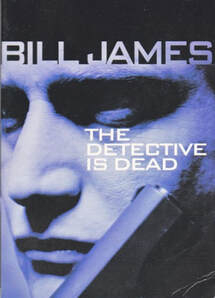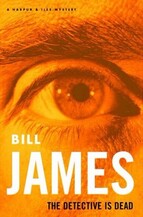
All that to say that The Detective Is Dead, James’s twelfth book in his consistently excellent and surprising series, once more spins a plot of policemen behaving darkly and criminals working hard to gain social acceptance. At the story’s start, two mid-level drug runners have been murdered and Claud Beyonton, a rival dealer, stands trial. The case is dismissed on lack of evidence when Harpur refuses to name his informant. The protection is noble but irrelevant, as Beyonton and his gang know the source is a cocky young man named Keith Vine, who would happily move up the ladder to fill the vacuum left by the dead dealers and an incarcerated Beyonton.
The character of Keith Vine, an optimistic buck with more swagger and self-confidence than he has a right to own, proves one of the most satisfying aspects of the book. Harpur feels a pang of responsibility when it becomes clear that Claud and his partners are gunning for Keith, and yet the informant has no intention of being relocated to France when there is money to be made in the local drug trade, especially if he pairs up with the knowledgeable Stan Stansfield. But Keith’s pregnant and pragmatic girlfriend Becky recognizes the danger and futility of drug dealing as a profession, and Harpur thinks he may be able to rescue the girl and her child from their circumstances even if Keith himself proves to be a moral (and mortal) lost cause.
The conflict between these two characters, with their radically different notions of family security, gives the story its beating heart. Once more, it’s difficult to bet just which characters will survive, let alone triumph, by the book’s end; in this author’s world (as in life), occasionally the innocent are slain and the villainous are rewarded. But when it arrives, the ending is satisfying and beautifully aligned with the tone of the series.
One minor quibble is that this is the second title, following the previous year’s In Good Hands, that allows the melodramatic ACC to land the book’s theme in a ponderous way. Here, Iles lies across three chairs at the precinct, arms folded across his chest, as he eulogizes about the death of the detective due to strangulation from the courts and the criminal code. Desmond Iles can act ostentatious and poetical – the performance surely appeals to his character – but it also feels a bit heavy-handed, like underlining a passage for mock emphasis. Still, it’s a minor irritant compared to what the ACC’s colleagues, Harpur and Chief Lane, have to put up with.

Most commonly, we see the story through one particular player’s point of view within a chapter. While it is sometimes Colin Harpur and his worldview that we experience, other chapters will let us access the thoughts and emotions of fascinating, flawed characters like Keith Vine or Panicking Ralph Ember. A performed dramatization can’t provide that inner perspective, since it is in James’s glorious, sharply funny prose that an individual's worldview comes alive. Dialogue and plot can be borrowed, but if we are not inside a character’s head, then we lack that true knowledge of, and emotional and intellectual connection to, him or her.
It's also instructive to note that the author (wisely) never lets the reader view certain characters through this inner P.O.V. technique. For example, ACC Iles is a truly menacing figure in part because his mind continues to safeguard its secrets. While we know all about Harpur’s doubts, desires, and dislikes – from a Harpur-oriented chapter, the prose offers this: “Christ, Becky was wasted on that sad little jumped-up nothing, Vine. Would Keith know how to reverence her and what she told of?” – Iles keeps his cards dangerously close to the vest, giving little away until it comes out in a spate of suppressed rage. James also never allows us to get inside of Harpur’s most essential informant, the gregarious art dealer Jack Lamb, thus only allowing us to see Jack the same way as the detective who relies on him.
There is art to this vivid exploration in prose of some (but not all) characters’ psyches, and it is certainly one reason why Bill James’s books are so memorable, enthralling, and unique within the police crime genre.
 RSS Feed
RSS Feed